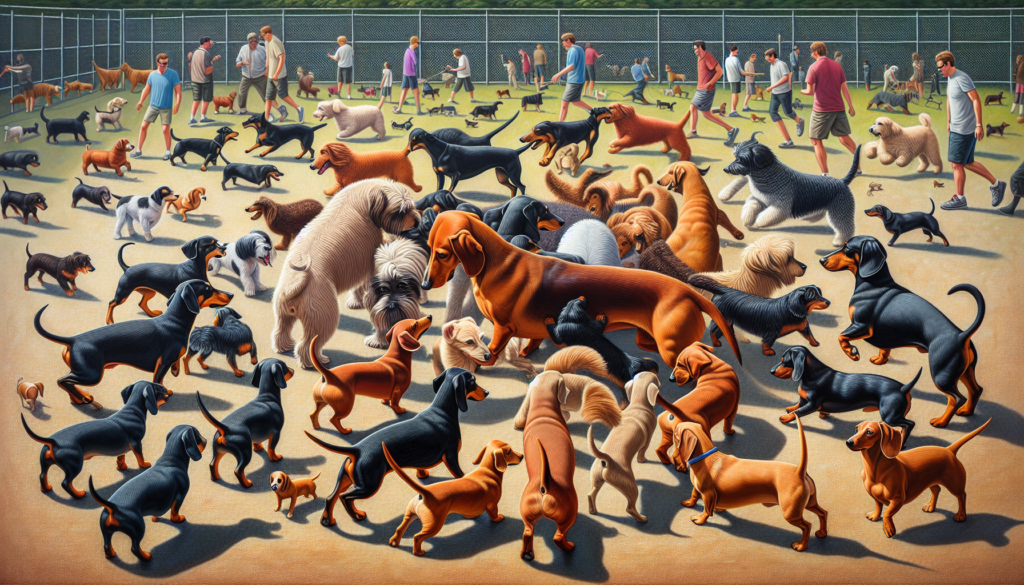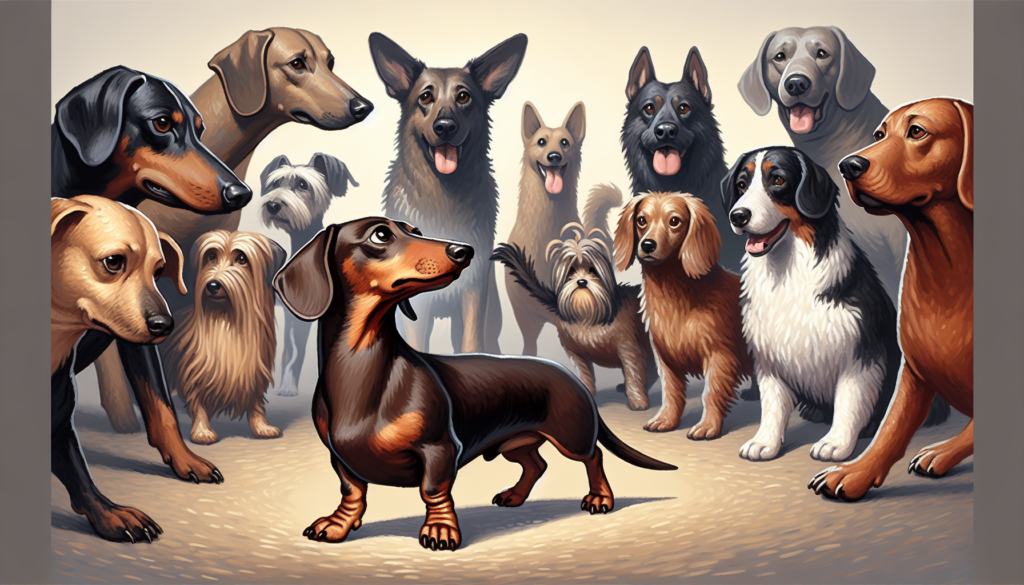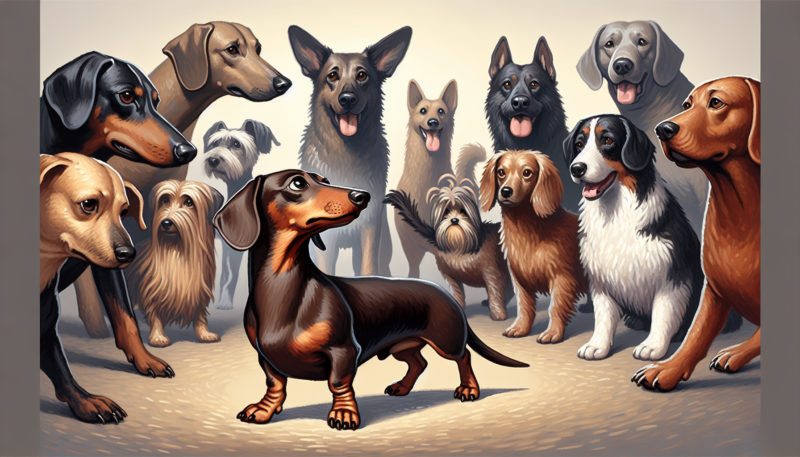If you’ve ever wondered whether Dachshunds are good with other dogs, look no further! This article provides valuable insights into the social dynamics of these lovable and unique canine companions. Whether you’re a proud Dachshund owner or considering adding one to your family, understanding their compatibility with other dogs is essential for fostering a harmonious and happy home. By exploring the temperament and characteristics of Dachshunds, we can gain a deeper understanding of their potential interactions with other canines, ensuring a positive and enriching experience for all. So let’s embark on this delightful journey and discover just how well Dachshunds get along with their furry pals!
Are Dachshunds Good With Other Dogs

Understanding the Dachshund Breed
Dachshunds, known for their elongated bodies and short legs, are a unique and lovable breed. Understanding their breed characteristics can shed light on how they interact with other dogs. Dachshunds were historically bred to be independent and courageous hunters, specifically for tracking and flushing out burrow-dwelling animals like badgers. Their keen sense of smell, determination, and protective nature have made them excellent hunting companions. These traits influence their behavior and compatibility with other dogs.
Temperament of Dachshunds
Dachshunds have distinct personality traits that can contribute to their compatibility with other dogs. They are often described as confident, intelligent, and spirited. However, they can also be stubborn, which can sometimes create challenges in their interactions with other dogs.
Dachshunds are known to be loyal and affectionate towards their owners. They often form strong bonds with their families and can exhibit protective behaviors. This loyalty may result in their preference for familiar dogs or a more cautious approach when meeting new ones.
Factors Affecting Dachshunds’ Compatibility with Other Dogs
Several factors can influence a Dachshund’s compatibility with other dogs. These include their individual temperament, early socialization experiences, and their exposure to different dogs throughout their lives. While some Dachshunds may have a natural predisposition towards being sociable and accepting of other dogs, others might be more reserved or even exhibit signs of aggression.
Socialization and Training
Proper socialization and training are essential for Dachshunds to develop healthy relationships with other dogs. Early exposure to various environments, people, and dogs can help them become well-adjusted and confident. Beginning socialization at a young age will aid in avoiding potential behavioral issues in adulthood.
Training is equally crucial for Dachshunds to understand basic commands and appropriate behaviors when interacting with other dogs. Positive reinforcement techniques, such as rewards and praise, are effective in shaping their behavior and encouraging friendly interactions.

Introducing Dachshunds to Other Dogs
When introducing a Dachshund to another dog, it’s essential to proceed with patience and caution. Slow and gradual introductions, preferably in neutral territory, can help avoid territorial behaviors and unnecessary conflicts. Allow the dogs to approach each other at their own pace, while closely monitoring their body language for signs of distress or discomfort.
Dachshunds and Small Dogs
Dachshunds often have an affinity for small dogs, possibly due to their natural prey drive. Their hunting background may influence their behavior towards smaller animals, including dogs. However, individual personalities and proper socialization play a significant role in determining their compatibility with small dogs.
With early socialization and consistent positive experiences, Dachshunds can coexist harmoniously with small breeds. Supervision and monitoring are still necessary, particularly when size differences are significant, to ensure the safety and well-being of all dogs involved.
Dachshunds and Large Dogs
Dachshunds can also get along well with larger dogs, but supervision and careful introductions are crucial. The size difference between Dachshunds and larger breeds should be considered, as accidental injuries can occur during play or rough interactions.
Proper socialization, positive reinforcement training, and clear communication between owners are essential in facilitating positive encounters between Dachshunds and larger dogs. Building trust and ensuring both dogs feel secure in their environment will contribute to a successful relationship.
Dachshunds and Different Breeds
Dachshunds’ compatibility with dogs of different breeds varies depending on individual personalities and early experiences. It’s important to remember that compatibility cannot be guaranteed solely based on breed characteristics. Each dog is unique, and their interactions should be evaluated on an individual basis.
With gradual introductions, supervised interactions, and appropriate training, Dachshunds can potentially develop positive relationships with dogs of various breeds. However, it is wise to consider their temperament and size differences, especially when dealing with dogs that have inherently different energy levels or temperaments.
Dachshunds and Same-Sex Dogs
Dachshunds can generally get along well with both male and female dogs. However, certain hormonal factors and individual personalities may influence their interactions with same-sex dogs. Neutering or spaying a Dachshund can help reduce potential dominance or territorial behaviors, making them more compatible with dogs of the same sex.
Regardless of the sex of the dogs involved, proper introductions, socialization, and ongoing training are pivotal in fostering a harmonious relationship between Dachshunds and same-sex dogs.
Common Challenges and Solutions
Despite their lovable nature, Dachshunds may encounter some challenges when interacting with other dogs. The breed’s protective instincts, stubbornness, and potential prey drive can contribute to occasional aggression or possessive behaviors.
To address these issues, seeking professional guidance from a certified dog trainer or behaviorist is highly recommended. These experts can provide personalized solutions tailored to the specific needs of your Dachshund, helping you navigate any difficulties and ensure a peaceful coexistence with other dogs.
In conclusion, the compatibility of Dachshunds with other dogs depends on various factors, including their individual temperament, early socialization, and training. While they can generally get along with other dogs, careful introductions and ongoing supervision are necessary to create positive relationships. With proper guidance and patience, Dachshunds can establish harmonious interactions with dogs of different sizes, breeds, and sexes, contributing to their overall well-being and happiness.
